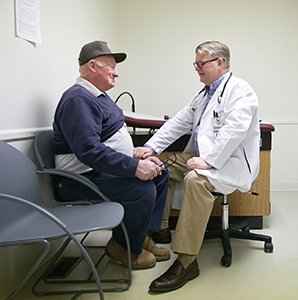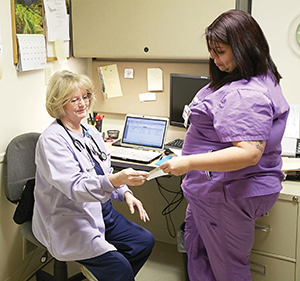A father-and-son doctor team ran Primary Care Associates in Shelbyville, Ky., a city of about 15,000 people, much the same from year to year.
Dr. Ron Waldridge Sr. opened the family practice 45 years ago and is semiretired. His son, Dr. Ron Waldridge II, said many of their business-office habits "amounted to an oral tradition. Dad would tell a new employee how to greet patients. He might holler if something wasn't done correctly."

Dr. Ron Waldridge II, right, meets with patient Eugene Rutledge II (Photo credit: Robert Burge)
Four of their 14 employees had been with them for at least 25 years. So imagine the staff trepidation when Catholic Health Initiatives of Englewood, Colo., owners of the practice for two years, announced an entirely new corporate structure for handling all business functions. Catholic Health Initiatives Physician Services, or CHIPS, was going to employ the staff and manage the office with its template of uniform procedures and business-management metrics.
"The employees were nervous," said Waldridge II, medical director for the four-doctor operation. "We didn't want to lose them or deal with a bunch of disruption."
How has it turned out?
"It's been pretty smooth," Waldridge II said. "We had no turnover. Operations are more efficient. I have more time to concentrate on seeing our patients."
Those are basic goals of CHIPS as it expands throughout the CHI system, said Beth Cafaro, CHI's vice president for practice operations and president of CHIPS, a subsidiary of the health care system. Eventually, CHIPS will manage all system-owned medical practices.
Swift progress
CHI created CHIPS in 2013 in a joint venture with MedSynergies of Irving, Texas, which has managed the business side of doctors' offices since 1996. CHIPS, a physician-led entity with its own board of directors, began assuming office functions for about 145 CHI-owned medical practices, beginning in Nebraska and North Dakota in January 2014. It expanded later that year into four more states, including Kentucky. By this January, CHIPS managed 270 practices and it was on track to serve almost all 450 of them by January 2016. CHI employs about 3,900 doctors, nurse practitioners and other health professionals in those groups, which mainly provide ambulatory care.
The transition to a unified management structure is the subject of an Innovation Forum led by Cafaro and Mike DeMott, MedSynergies vice president of client management, during the Catholic Health Assembly in Washington, D.C., in June.
Cafaro said CHI created CHIPS to help its medical groups operate more efficiently, increase patient visits and generate more revenue. CHIPS assumes employment of office staffs; institutes procedures for appointments, billings, insurance claims and other functions; and applies metrics to monitor efficiency, workloads and the duties of individual employees. (See box.) A call center in Texas assists in contacting patients for appointment reminders, billing and other patient relations.
An overall goal for CHI is a revenue and cost-reduction gain of $100 million over the first three years. Cafaro said collections and revenue already are improving in the CHIPS markets. "We are moving in the right direction," she said.
On-boarding employees
With CHI providing health care in 18 states, the variation in medical-office business models it encounters is wide. That creates a big challenge in getting employees to follow the same protocols and embrace the CHIPS business model. Phasing it in over time across the CHI system allows the CHIPS staff to build experience as it expands its reach, said Cafaro.

Medical assistants Wilma Collins, left, and Alicia Bradley consult on patient files at Primary Care Associates. The group practice in Shelbyville, Ky., is readily adapting to management procedures introduced by Catholic Health Initiatives Physician Services. (Photo credit: Robert Burge)
"We don't want to go in with a big bang," she said. "That usually isn't met with open arms. People are thinking, 'We work hard. Who are you to come in and tell us what to do?' We don't want them thinking they haven't done good work. They are smart people. If we can show them how to change their work flows, there can be big improvements as well as more time for providers to spend with their patients."
Cafaro said CHIPS employs regional representatives in each of its markets who work with office staffs in setting up new systems and then visit at least monthly to monitor progress and assist in solving problems. She said the planning and training from introduction to execution in a medical group usually takes about six months.
DeMott of MedSynergies gives the joint venture "a solid B" in its progress.
"For some practices and markets, the disciplines we are instilling and the metrics we are tracking are new experiences for practice staff," he said. "Getting past that normal first reaction to change is always the biggest hurdle."
Top-of-license work
Waldridge II grew up in Shelbyville, which is about 35 miles east of Louisville, Ky., graduated from the University of Louisville School of Medicine and returned home to practice family medicine with his father. Their group sold Primary Care Associates six years ago to Jewish Hospital of Louisville and became part of CHI with the creation of KentuckyOne Health in early 2012.
CHIPS went online at Primary Care Associates last July, and Waldridge II said he already has seen improvement in patient scheduling and monitoring of routine care. He said CHIPS has required the staff to fill out more reports, but the resulting analysis of work flow and job duties has made the workday more efficient, both for the office staff and the doctors.
"Part of the system is to get everyone to work at the top of their licenses and duties," he said. "In the past, a receptionist may have taken a phone call and brought the message directly to me. Now, nurses and schedulers have a clearer guidance on what they can do without asking."
Waldridge II said CHIPS analysis of patient-care histories coupled with automated telephone-contact systems, help ensure that patients are urged to get mammograms or prostate exams, even when they don't ask. "If somebody comes in for a sore throat, that is what I'll tend to deal with," he said. "Flipping through charts isn't always the most efficient way to monitor treatment. CHIPS provides enhancements to our patient-management software that we couldn't afford on our own."
Billings and collections have improved, he said, especially in enforcing co-pays. A sound reason for the change, he said, is this: "Most doctors never went to business school."
| Tuning up a physician practice Catholic Health Initiatives Physician Services provides CHI-owned physician practices with resources, expertise and analytic tools to refine business processes. Service offerings include: - Revenue cycle management
- Practice assessment
- Human resources support
- Patient outreach and referral scheduling tools
- Service line assessments
- Physician analytics and engagement tools
|
Copyright © 2015 by the Catholic Health Association
of the United States
For reprint permission, contact Betty Crosby or call (314) 253-3477.